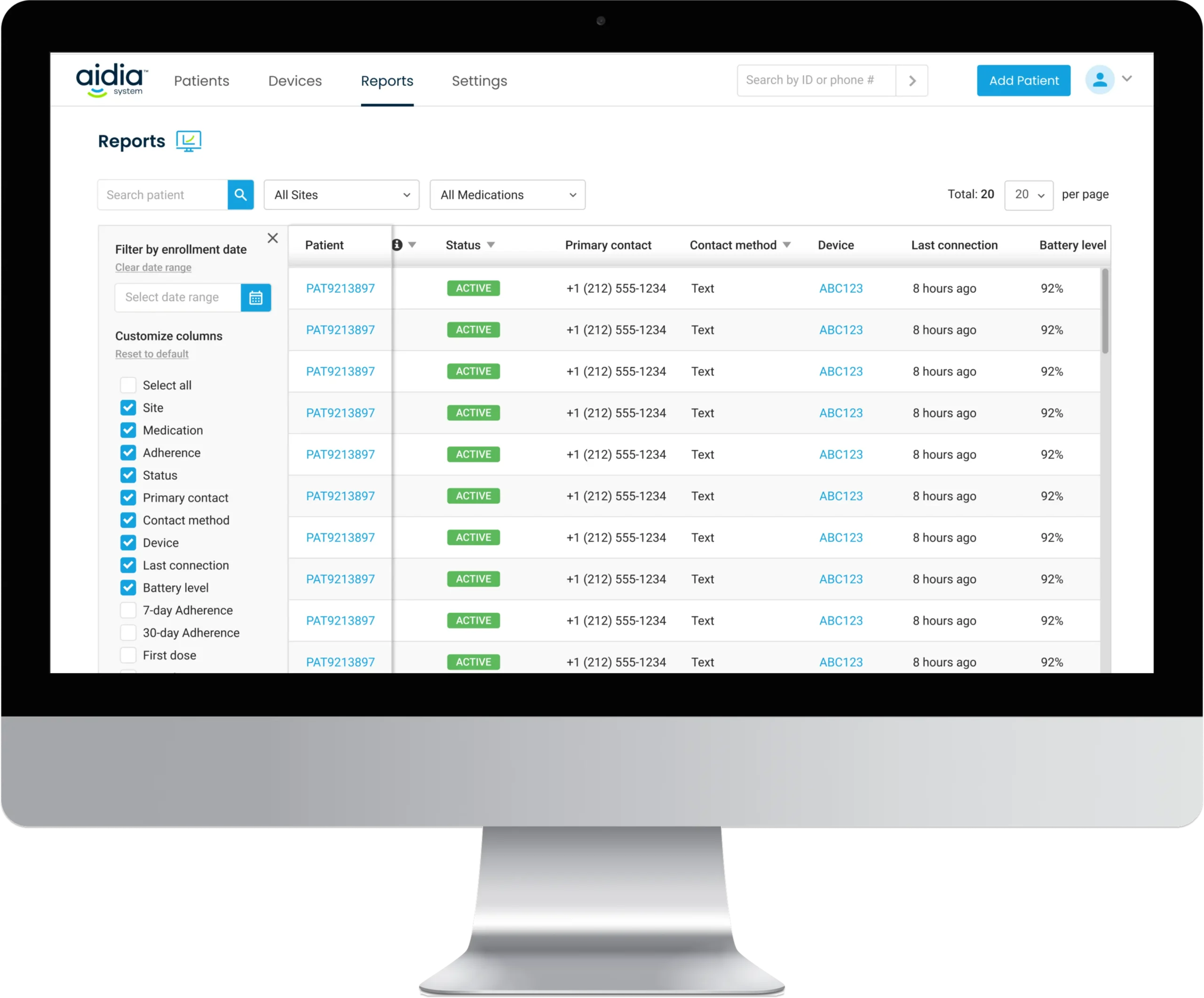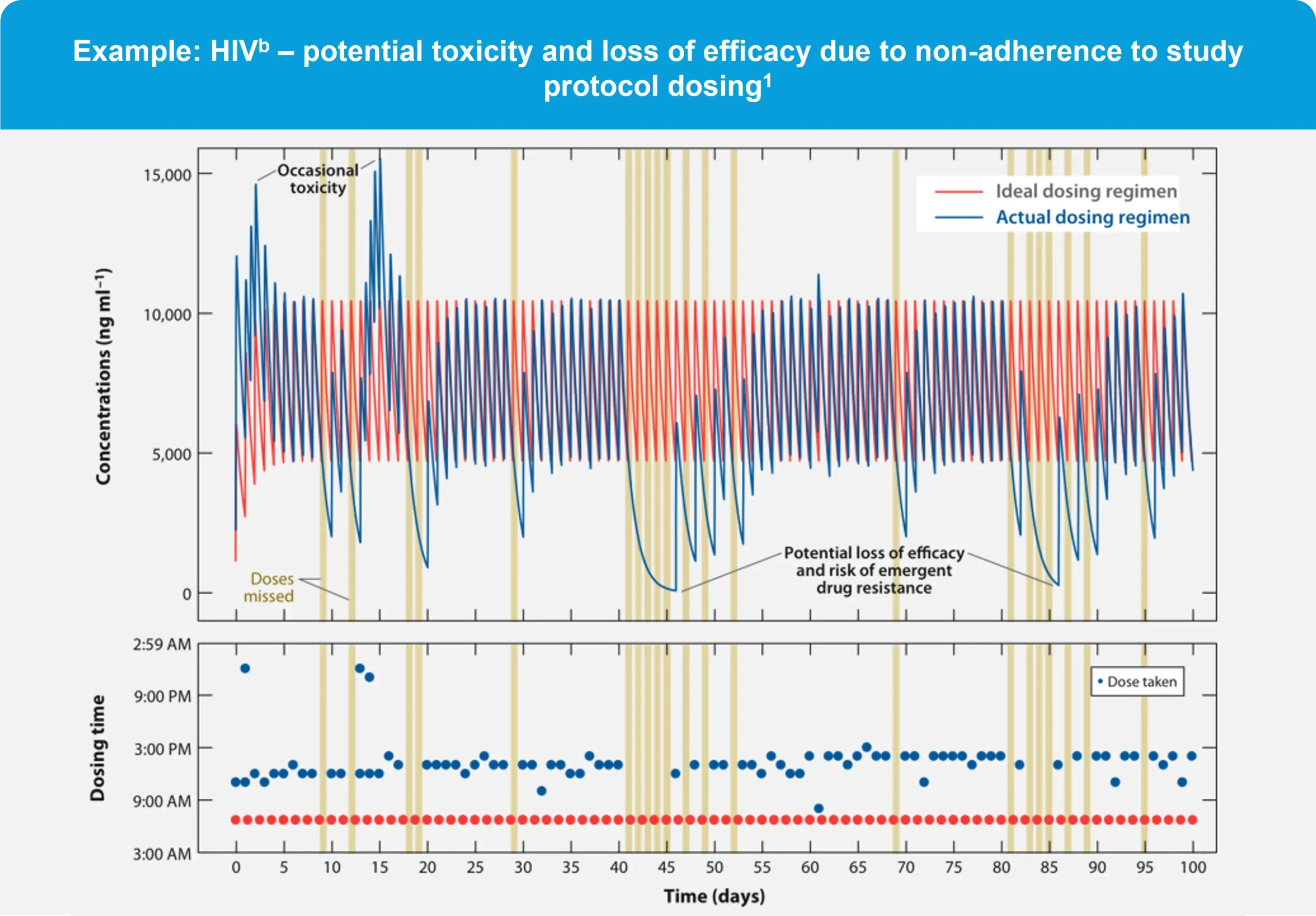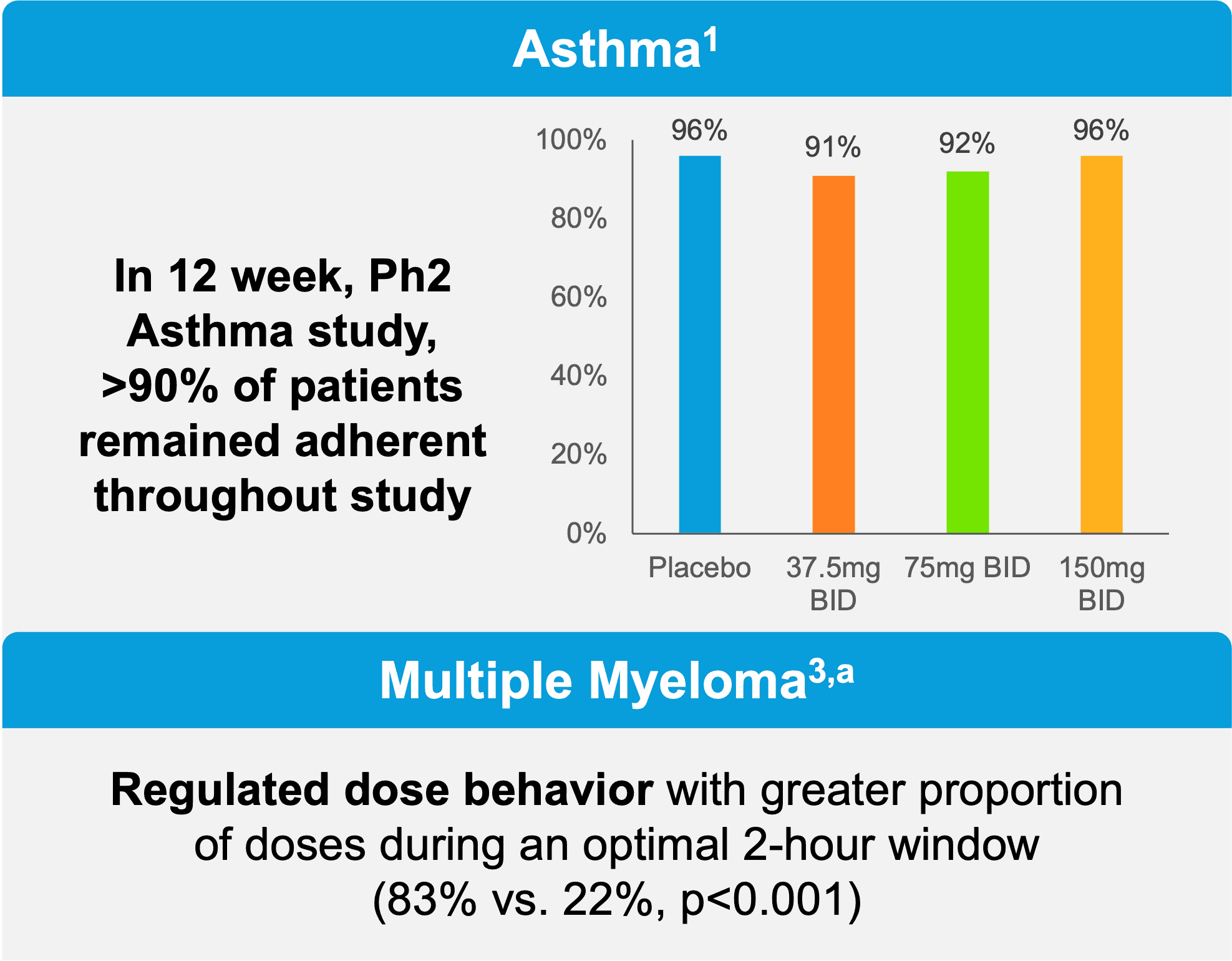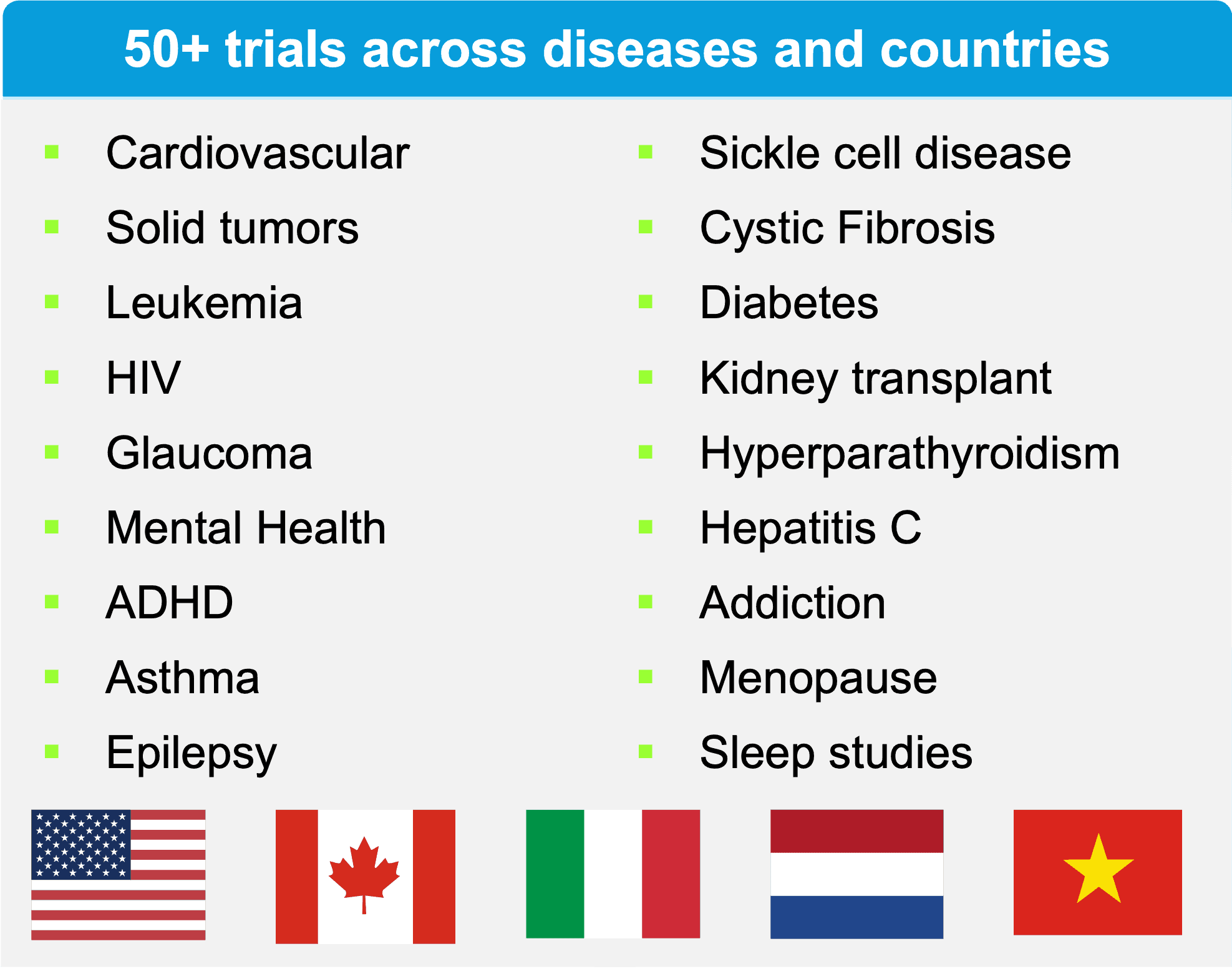The Only Smart Cap That Doesn’t Impact Stability Testing For Your Clinical Trial
Unlike other cap covers used for trials, the Aidia Smart Cap attaches securely over existing prescription bottle caps. No stability testing required.
Everything you need to improve protocol adherence
- Smart prompts keep patients on track with lights, chimes, and next/last dose display
- Always connected to care: Cellular technology means no WiFi, Bluetooth or App setup required
- Recognizes every time a dose is taken and sends a cellular signal to the database
- Customized adapter and ring ensure that Smart Cap fits multiple Rx bottle cap sizes
- No transferring or contact with medication
- Text message reminders to patients and their caregiver
Light ring
Changes colors to alert events such as dose time and battery status.
OLED display screen
Shows dose events, last open time, battery level, and more.
USB-C charge port
Arrives charged with up to 5 months of battery life.
Action button
Cycles through screens with helpful information.
Everything you need to improve protocol adherence
- Smart prompts keep patients on track with lights, chimes, and next/last dose display
- Always connected to care: Cellular technology means no WiFi, Bluetooth or App setup required
- Recognizes every time a dose is taken and sends a cellular signal to the database
- Customized adapter and ring ensure that Smart Cap fits multiple Rx bottle cap sizes
- No transferring or contact with medication


Aidia’s platform generates reports that validate your clinical study
- Enrollment metrics
- Dose behavior
- Gap days
- Escalation types
- Persistence rate
- Disenrollment reasons
- Adverse events
- Adherence by location

Aidia’s platform provides data feeds & reports that validate your study
- Enrollment metrics
- Dose behavior
- Gap days
- Escalation types
- Retention rate
- Disenrollment reasons
- Adverse events
- Protocol compliance by location
Enhance your research by collecting key data points
- Real-time dose taking data with resolution timestamps to the second
- Integration into monitoring systems
- Match compliance data with trial efficacy data for in-depth insights
- Raw data downloads provide data for interim and adjunct study analysis
- Contact support via portal
Discover how clinical trials are leveraging Aidia to boost participant compliance
Discover how clinical trials are leveraging Aidia to boost participant compliance
My research colleagues and I conducted a randomized controlled trial of an educational intervention to improve glaucoma medication adherence. The patients using the Aidia Smart Bottle and messaging functions showed 20% higher adherence to the medication regimen compared to the control arm.
Given the adherence seen in the trial, my sense is that the AdhereTech Smart Bottle has a very positive impact on our study’s adherence rates.
Poor Protocol Compliance is a Critical yet Addressable Issue, Silently Undermining Clinical Trials, Increasing Recruitment Costs, Study Timelines, & Risk of Study Failure
In an analysis of 95 clinical trials for oral medications across 28 therapeutic areas half of the 16,907 participants exhibited substantial deviations from study protocol dosing:
- Included highly motivated patients: transplant recipients, HIV, breast cancer, heart failure.
- 20% of participants stopped treatment after 3 months, and almost 40% stopped treatment after one year.
- Included other severe issues: interruptions, drug holidays, irregular intervals.

1. Blaschke TF, Osterberg L, Vrijens B, Urquhart J. Adherence to Medications: Insights Arising from Studies on the Unreliable Link Between Prescribed and Actual Drug Dosing Histories. Annual Review of Pharmacology and Toxicology. 2012;52(1):275-301. doi:https://doi.org/10.1146/annurev-pharmtox-011711-113247
2. Robin DiMatteo M, Giordani PJ, Lepper HS, Croghan TW. Patient Adherence and Medical Treatment Outcomes. Medical Care. 2002;40(9):794-811. doi:https://doi.org/10.1097/00005650-200209000-00009
3. Hichborn J, Kaganoff S, Subramanian N, Yaar Z. Using data to improve patient adherence | McKinsey. www.mckinsey.com. Published December 14, 2018. https://www.mckinsey.com/industries/life-sciences/our-insights/improving-patient-adherence-through-data driven-insights
4. Hansen LA. Impact of Nonadherence to Cancer Therapy. The Oncology Nurse. Published 2017.
5. Medication nonadherence: Medicine’s weakest link. www.wolterskluwer.com. Accessed April 4, 2024. https://www.wolterskluwer.com/en/expert-insights/medication-nonadherence-medicines-weakest-link
6. Addressing Disparities in Medication Access and Adherence. phrma.org. Published May 1, 2022. https://phrma.org/en/Equity/Addressing-Disparities-in-Medication-Access-and-Adherence
Studies Show Pill Counting and Patient Surveys Grossly Overestimate Adherence to Medication
Pill count
60% accurate
Self-report
27% accurate
Patient apps and video recording add to patient burden minimizing accuracy:
- Prone to bias with increased risk of placebo effect.
- Technical problems, such as upload issues and camera complications.
- Patients forgetting to self-record.
An analysis evaluating the accuracy of pill count across separate studies concluded it “grossly overestimates adherence” and “its continued use in clinical trials cannot be justified.”
Sources: 1. El Alili et al. British Journal of Clinical Pharmacology. 2016, 82(1):268-279; 2. Pullar et al. Clinical Pharmacology and Therapeutics. 1989, 46(2):163-168; 3. Cramer et al. JAMA. 1989, 261(22):3273-3277; 4. Bangsberg et al. AIDS. 2000, 14(4):357-366; 5. Mason et al. JMIR mHealth and uHealth. 2022, 10(3):e35157; 6. FDA. Enrichment strategies for clinical trials to support determination of effectiveness of human drugs and biological products: Guidance for industry, 2019.
Aidia is Proven to Increase Adherence and has been Applied Repeatedly in an Interventional Setting


a) Randomized pilot studies. Sources: 1. Siddiqui S et al. The Journal of Allergy and Clinical Immunology. 2023, 152(5):1121-1130.e10; 2. Newman-Casey et al. Ophthalmology Glaucoma. 2020, 3(4):228-237; 3. Mauro et al. Journal of Managed Care & Specialty Pharmacy. 2019, 25(11):1244-1254; 4. Ellsworth et al. JAIDS Journal of Acquired Immune Deficiency Syndromes. 2021, 86(1):73-80. HIV, human immunodeficiency virus.
The Aidia System can be easily and quickly implemented having been successfully used in more than 50 academic and pharma clinical trials


Source: Data on file. ADHD, Attention deficit hyperactivity disorder; HIV, human immunodeficiency virus.